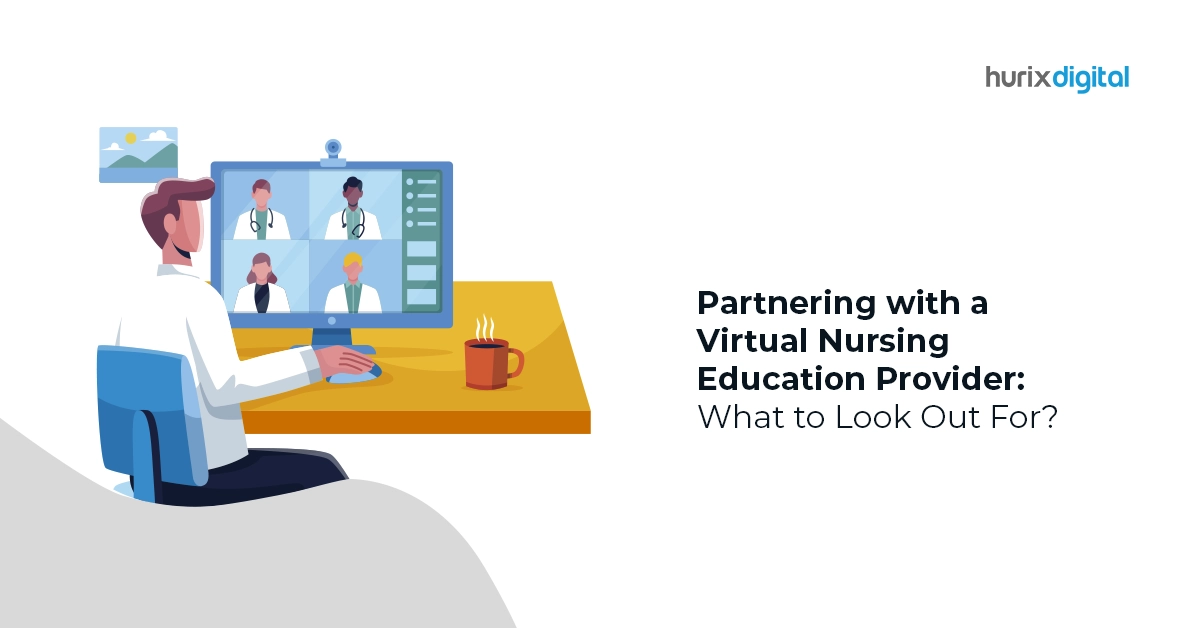Partnering with a Virtual Nursing Education Provider: What to Look Out For?
Virtual nursing is gaining traction, and proper education about how it can help healthcare providers navigate through its complexities is needed. If you are looking to partner with a virtual nursing education provider, you need proper insights into the best practices to make the implementation effective and impactful.
This blog discusses the 5 crucial aspects to consider when making an informed choice.
Table of Contents:
- About Virtual Nursing Education
- Things to Look for in Virtual Nursing Education Providers
- Moving Ahead
About Virtual Nursing Education
Hospitals and health facilities worldwide are fast recognizing the exceptional value delivered by virtual nursing. It is gradually becoming a standard as it offers innovative, flexible, and functional solutions to a wide array of pressing challenges plaguing the nursing vertical.
The virtual care path needs well-trained professionals. This calls for strategically partnering with virtual nursing education providers. The section below offers insights into the qualities that you may look for in a prospective educator to reap maximum benefits.
Also Read: Healthcare Data Security: Ensuring Privacy and Compliance in App Development
Things to Look for in Virtual Nursing Education Providers
The foundation of virtual nursing is videoconferencing technology. It allows nurses to work from remote locations. They can conduct admission interviews, observe patients, offer satisfactory answers to the queries of patients or their family members, spell out discharge modalities, and carry out tasks that don’t require physical closeness. This eases the pressure on bedside nurses.
If you plan to enroll in online nursing programs that include virtual nursing education or want to expose your nurses to training, you need to check if the educator offers the following:
1. Clinical Experience through Virtual Simulation
Your educator must train you on good nursing simulation software to enrich your offsite caregiving competence. This will build your confidence through simulated clinical experiences.
A good simulator designed to impart distance learning for nurses should have certain characteristics, like:
- Authored by veteran nurses
- Learning chapters inspired by real-life nursing scenarios
- Interactive and adaptive simulations that can promote self-paced learning
- Provision for personalized feedback with the ability to customize learning modules based on identified shortcomings for individual students
- Option for practicing with diverse patient cases through high-fidelity simulators to measure the efficacy of decision-making and clinical reasoning skills
- Ability to choose from varied patient cases that can complement the learning nurses’ evolving skill development requirements
- Capability to access realistic clinical scenarios online anywhere, anytime
- The presence of yardsticks that critically analyze and measure the progress of learners on tangible cornerstones
- Delivery of quick, precise, and personalized remediation for identified weaknesses in the learning roadmap
- Expand the learning scope intuitively to accommodate changes in the nursing landscape
The immersive experience offered by simulators would sufficiently reinforce caregiving skills even without interacting with real patients. The virtual nursing education technology equips you with insights and proficiencies needed to seamlessly transition to practice.
2. Lessons on Managing Stress and Burnout
Virtual nurses will have to confront psychological demands more. This will take a toll on their mental health. Your educator must offer an overview of numerous sources of stress that you may encounter during a shift.
Further, the educator must offer tools and resources to tackle workplace challenges with the right mindset. This implies access to tools and mind-calming techniques that can make you more agile in striking the right balance between life and work. You should feel armed with tactics to effectively handle stress-related burnout after completing the program.
3. Hands-On Training for Handling IT Tools
Virtual nursing’s success depends on how well the nurse can focus on the patients from a remote location and discern their discomfiture or requirements. This implies that the educator must offer hands-on training to prospective nurses on handling video conferencing tools and other audio-visual aids effectively.
You must ensure the educator has enough state-of-the-art IT resources to offer comprehensive training on contemporary software. After undergoing the training, a nurse should be able to perform activities like:
- Zoom the camera of the laptop or transmission device to observe patients, readings of monitoring equipment, and medication data closely
- Pan the camera through the patient’s room or ward to have a clear vision of the ambiance or atmospheric elements
- Convey medication or care details to the patients without relying on support from bedside nurses
- Communicate remotely with different stakeholders like other nurses, doctors, interpreters, etc., and offer consultation accurately
- Configure EMR (Electronic Medical Record) of patients by giving directions to the person updating the respective patient’s history
4. Incorporation of Managerial Skills
Virtual clinical experiences are not restricted merely to looking after patients from a distant location. A virtual nurse must be adept at doing many incidental things that can directly or tacitly impact the outcome of the caregiving process. The educator with whom you would partner must impart some managerial skills to the virtual nurses.
These would primarily include:
- The ability to manage change on the part of nurses and seamlessly adapt to new situations quickly
- The capability of offering qualitative feedback and suggestions to fine-tune and improve the caregiving exercise
- The flair for communicating precisely and adequately with the onsite nursing team and engaging in meaningful dialogues about patients’ comfort levels and needs
- The art of interacting discreetly with patients or their relatives without exciting their dread or anxiety quotients by bluntly divulging inappropriate details
- The inclination to collaborate with remote nurses, work in synergy, and defuse conflict situations
- The knack to focus exclusively on the KPIs (Key Performance Indicators) or things that the virtual nurse would be responsible for to reduce confusion
- The ability to convey challenges, support requirements, and technology infrastructure deficiencies to the IT team to secure timely help
5. Insights into Holistic Support Structure
Hospitals, too, are increasingly filling vacancies for remote nurses. As a hospital administrator, you can subject your HR team to a few lessons from the education partner offering accredited online nursing courses.
The purpose of such training would be to make the HR or administrative team aware of
- The nuances of roping in remote nurses in a professional space traditionally dominated by bedside nurses
- The strategies to adopt for recruiting remote nurses and skills to look for in prospective candidates
- The requirements or responsibilities that virtual nurses have to fulfill
- The metrics to decide the professional tenure of remote nurses and shape the hybrid profile of nurses willing to work both as bedside and virtual caregivers
- The parameters to ascertain the nurses’ satisfaction levels and device retention policies
This training is important because the aging fleet of present nurses is posing a challenge for health service providers. In the USA alone, the median age of nurses is 52, and 4.7 million nurses are expected to bow out by 2030.
Also Read: Assessment Strategies in Healthcare Curriculum Design: Evaluating Competency and Learning Outcomes
Moving Ahead
The importance of strategically partnering with a virtual nursing education provider cannot be overstated. A shortage of nurses is looming ahead as the population of bedside nurses is shrinking compared to the increasing workload.
Administrators have to think about how to do the caregiving exercise differently. In the face of these trying circumstances, the virtual nursing program is the only panacea.
At Hurix Digital, we offer curated and holistic virtual nursing programs for aspiring candidates as well as healthcare institutions. Our seasoned team designs eclectic courses that draw from the best practices in virtual nursing from across the world. We deploy state-of-the-art and cutting-edge simulation software and enhance its fidelity to optimize the virtual training outcomes.
Connect with us to embark on an innovative journey of patient care.

Sr Vice President – Sales
With 25 years of expertise in sales and leadership, encompassing a decade and a half dedicated to the Edtech sector, she stands as a catalyst for change. Her knack lies in unearthing inventive and forward-thinking strategies and also in delivering exceptional customer service, empowering digital clients to realize their aspirations.









